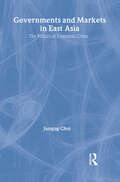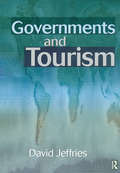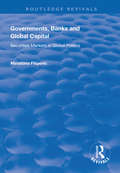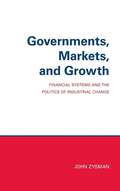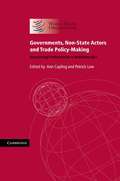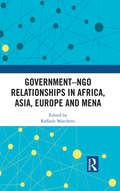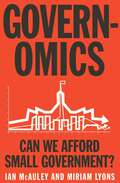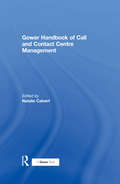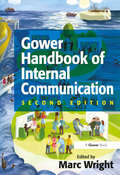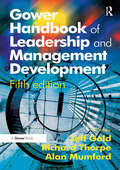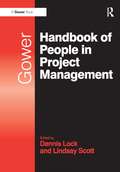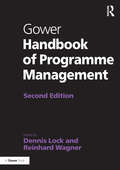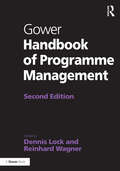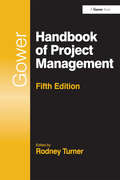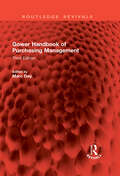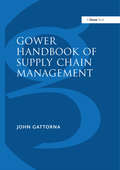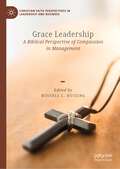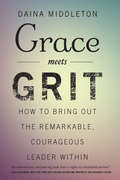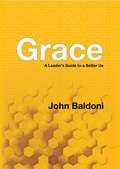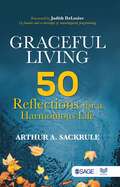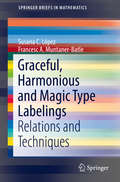- Table View
- List View
Governments and Markets in East Asia: The Politics of Economic Crises (Routledge Malaysian Studies Series #Vol. 3)
by Jungug ChoiGovernments and Markets in East Asia examines the relationship between economic performance, elite co-operation, and political regime stability in the context of the Asian crisis, and argues that economic crisis is not the cause of greater political harmony or discord, but rather that it serves as a catalyst that may encourage elites to cooperate or conflict depending upon the particular circumstances at the time of crisis. This book maintains that the political consequences of the Asian crisis varied according to the type of elite that existed in each stricken society. Including a comprehensive comparative study of five countries' experiences during the economic crisis: Indonesia, Thailand, Malaysia, South Korea and the Philippines, this book investigates the pre-crisis political context and elite configuration of these five countries, and considers what lessons can be drawn from their experiences. Constituting an impressive body of descriptive and theoretical material on the Asian crisis, this book looks towards the implications of economic crisis for elite behaviour and political stability.
Governments and Tourism
by David Jeffries'Governments and Tourism' is a unique text that studies the general and specific tourism policies from central to local government. Through case studies from around the world, including the UK, USA and France, the role and function of Official Tourism Administrations (OTAs) are evaluated. Governments and Tourism is essential reading for busy practitioners,who wish to know:* How different countries and communities have coped with the opportunities and threats posed by tourism* How they plan to address future opportunities and thresats posed by tourism* What lessons can be applied elsewhere* What should be the complementary functions of the public and private sectors
Governments, Banks and Global Capital: Securities Markets in Global Politics (Routledge Revivals)
by Miroslava FilipovićPublished in 1997, this study analyzes the global capital market as one of the most dynamic aspects of the world economy. As more financial markets were created, the security of the structure came under scrutiny. The book examines the crises in its history and how the global structure can be regulated.
Governments, Markets, And Growth: Financial Systems And Politics Of Industrial Change (Cornell Studies In Political Economy Series)
by John ZysmanThe deterioration in the economic performance of the advanced industrial democracies during the 1970s has provoked an intense debate about the role of government in economic adjustment and growth. In Governments, Markets, and Growth, John Zysman makes a significant contribution to our understanding of these critical international issues by demonstrating that there is a direct relationship between a nation's financial system and its government's ability to restart the growth engine. Professor Zysman argues that there are three distinct types of financial systems, each with different consequences for the political ties between financial markets, industry, and government. Zysman tests his argument by analyzing and comparing the patterns of industrial adjustment in five advanced nations. He contrasts the differing strategies of industrial adjustments primarily in France and Great Britain, but also in Japan, West Germany, and the United States. Governments, Markets, and Growth will be invaluable to the international banking and business community, a wide variety of government officials, and students of political science, economics, and business administration.
Governments, Non-State Actors and Trade Policy-Making
by Patrick Low Ann CaplingOne of the most pressing issues confronting the multilateral trade system is the challenge posed by the rapid proliferation of preferential trade agreements. Plenty has been written about why governments might choose to negotiate preferentially or multilaterally, but until now it has been written almost exclusively from the perspective of governments. We know very little about how non-state actors view this issue of 'forum choice', nor how they position themselves to influence choices by governments about whether to emphasize PTAs or the WTO. This book addresses that issue squarely through case studies of trade policy-making and forum choice in eight developing countries: Chile, Colombia, Mexico, South Africa, Kenya, Jordan, Indonesia and Thailand. The case studies are based on original research by the authors, including interviews with state and non-state actors involved in the trade policy-making process in the eight countries of this study.
Government–NGO Relationships in Africa, Asia, Europe and MENA
by Raffaele MarchettiThis volume brings together some of the most recent scholarship on government and civil society. It examines the axis of the relationship between national governments and civil society organisations (NGOs) by highlighting commonalities as well as differences among four key regions in the world. Using the stability vs. instability framework, the book explores a range of pertinent issues, including human rights, development, foreign policy, state-building, regime change, governance frameworks, wars and civil liberties. It studies diverse situations, from those entailing comprehensive cooperation to those involving politically contentious and revolutionary activities. With case studies from Africa, Asia, Europe, and the Middle East and North Africa (MENA), this volume will be useful to scholars and researchers of political science, global politics, international relations, sociology, development studies, global governance and public policy, as well as to those in the development sector and NGOs.
Governomics: Can we afford small government?
by Ian McAuley Miriam LyonsPeople have good reason to demand decent public education and a well-funded health system, to yearn for an economy that doesn't trash the environment or for a smaller gap between rich and poor. Almost without exception, sound economics is on their side. We've grown used to public debates that pit people and the planet against an abstract, distorted image of 'the economy', but it doesn't have to be this way. Governomics shows that an emaciated state is bad for business, and that standing up for government means standing up for a public sector that truly serves the public. 'Everybody knows governments are wasteful, incompetent and a drag on the economy. But if you're not sure that's true, read this book.' Ross Gittins, Sydney Morning Herald and The Age 'Governomics shows that a market economy can only work when sustained by a strong and active public sector. It will inject some much-needed economic sanity into conversations on the role of government in Australia.' John Quiggin, Australian Research Council Laureate Fellow, University of Queensland
Gower Handbook of Call and Contact Centre Management
by Natalie CalvertCall centres and contact centres form an important and rapidly growing part of today's business world. They present a range of management challenges, from strategic decisions about how to develop a customer strategy, business planning, through to detailed considerations of staffing levels and appropriate technology. This new handbook, the first of its kind, provides a unique insight giving expert opinions on how to get the most out of your contact centre operations. Natalie Calvert, a specialist in the field, has brought together a team of 35 experienced practitioners who provide invaluable knowledge, share their experiences and draw on real-life examples to suggest practical solutions on a wide range of topics. This handbook is an indispensible guide and reference for call and contact centre managers, HR specialists and senior executives responsible for marketing, sales or customer services. The handbook is divided into six parts: I The business plan II The people factor III Contact centre technology IV Standards, processes, and outsourcing V Building profitable customer relationships VI The future.
Gower Handbook of Internal Communication
by Marc WrightA comprehensive guide to managing communication within organizations, the Handbook recognises Internal Communication's continued growth as a management discipline. It is aimed at leaders who want insight into IC techniques for use in both day-to-day operational and change situations, for example, and also at the communication specialist seeking shared wisdom and new ideas. Early chapters examine changes in the strategic context in which today's IC departments are operating. These include organizations' increasing need for innovation and responsiveness in a superfast changing environment; employees' increasing assertion of rights and personal requirements at work; management's increasing recognition of the importance of corporate reputation/brand value, particularly how to sustain and extend it; and finally, the effects on work and management patterns of digital communication. Step-by-step guides introduce you to creating IC strategies and to carrying out research and measurement.
Gower Handbook of Leadership and Management Development
by Richard ThorpeOn few occasions in the history of modern management have leadership skills been in such sharp focus as they are now. The ability to direct often very large and diverse organizations; to make sense of the complex and turbulent markets and environments in which you operate; and to adapt and learn seems at an all time premium. The premise behind the fifth edition of this influential Handbook is that leadership, management and organizational development are all parts of the same process; enhancing the capacity of organizations, whatever their size, and the people within them to achieve their purpose. To this end, the editors have brought together a who's who of current writers on leadership and development and created the definitive single volume guide to the subject. The perspectives that the text provides to leadership, learning and development, embrace the formal and the informal, cultures and case examples from organizations of all kinds; and offers readers a rigorous, readable and, where appropriate, ground-breaking book. In the 14 years since the fourth edition of this classic book, very much has changed. But the need for this Handbook is as strong as ever and the Fifth Edition of Gower Handbook of Leadership and Management Development is set to become a definitive read for senior managers and those who develop them and an essential reader for the management students aspiring to become the next generation of leaders.
Gower Handbook of People in Project Management (Project and Programme Management Practitioner Handbooks)
by Lindsay ScottModern projects are all about one group of people delivering benefits to others, so it's no surprise that the human element is fundamental to project management. The Gower Handbook of People in Project Management is a complete guide to the human dimensions involved in projects. The book is a unique and rich compilation of over 60 chapters about project management roles and the people who sponsor, manage, deliver, work in or are otherwise important to project success. It looks at the people-issues that are specific to different sectors of organization (public, private and third sector); the organization of people in projects, both real and virtual; the relationship between people, their roles and the project environment; and the human behaviours and skills associated with working collaboratively. Thus this comprehensive and innovative handbook discusses all the important topics associated with employing, developing and managing people for successful projects. The contributors have been drawn from around the world and include experts ranging from practising managers to academics and advanced researchers. The Handbook is divided into six parts, which begin with management and project organization and progress through to more advanced and emerging practices. It benefits hugely from Lindsay Scott’s expert knowledge and experience in this field and from Dennis Lock’s contributions and meticulous editing to ensure that the text and illustrations are always lucid and informative.
Gower Handbook of Programme Management (Project And Programme Management Practitioner Handbooks Ser.)
by Reinhard Wagner Dennis LockIn the ten years since this Gower Handbook was first published, Programme Management has been transformed to become the vehicle of choice for realising the objectives of large scale, complicated, business, government and social investment. The Second Edition of this Gower Handbook is a completely new text; designed as a definitive guide to the current state of Programme Management. To that end the text offers foundation theory and knowledge around key issues such as, managing programme contracts, people and know-how, complexity and uncertainty, benefits and success measures, as well as every stage of the programme life cycle. The main central section of the book provides theory, tools, advice and examples of practical application from an industry context and covers sectors including construction, energy, aerospace and defence, IT, automotive and the public sector. The Handbook also includes a section with chapters on assessing and improving programme competences and developing maturity. Discrete chapters relate programme management to the international baselines and standards. Collectively, the Gower Handbook of Programme Management is most comprehensive guide to the subject that you can buy.
Gower Handbook of Programme Management (Project And Programme Management Practitioner Handbooks Ser.)
by Reinhard Wagner Dennis LockIn the ten years since this Gower Handbook was first published, Programme Management has been transformed to become the vehicle of choice for realising the objectives of large scale, complicated, business, government and social investment. The Second Edition of this Gower Handbook is a completely new text; designed as a definitive guide to the current state of Programme Management. To that end the text offers foundation theory and knowledge around key issues such as, managing programme contracts, people and know-how, complexity and uncertainty, benefits and success measures, as well as every stage of the programme life cycle. The main central section of the book provides theory, tools, advice and examples of practical application from an industry context and covers sectors including construction, energy, aerospace and defence, IT, automotive and the public sector. The Handbook also includes a section with chapters on assessing and improving programme competences and developing maturity. Discrete chapters relate programme management to the international baselines and standards. Collectively, the Gower Handbook of Programme Management is most comprehensive guide to the subject that you can buy.
Gower Handbook of Project Management: Cd (Routledge Revivals Ser.)
by Rodney TurnerThis Handbook was the first APM Body of Knowledge Approved title for the Association for Project Management. Over the course of five editions, Gower Handbook of Project Management has become the definitive desk reference for project management practitioners. The Handbook gives an introduction to, and overview of, the essential knowledge required for managing projects. The team of expert contributors, selected to introduce the reader to the knowledge and skills required to manage projects, includes many of the most experienced and highly regarded international writers and practitioners. The Fifth Edition has been substantially restructured. All but two of the authors are new, reflecting the fast-changing and emerging perspectives on projects and their management. The four sections in the book describe: ¢ Projects, their context, value and how they are connected to organizational strategy; ¢ Performance: describing how to manage the delivery of the project, covering scope, quality, cost, time, resources, risk and sustainability ¢ Process: from start up to close down ¢ Portfolio: the project and its relationship to the organization The discrete nature of each chapter makes this Handbook a wonderful source of advice and background theory that is easy to consult. Gower Handbook of Project Management is an encyclopaedia for the discipline and profession of project management; a bible for project clients, contractors and students.
Gower Handbook of Purchasing Management: Third Edition (Routledge Revivals)
by Marc DayOriginally published in 2002, the revised third edition of the Gower Handbook of Purchasing and Supply Management views procurement as standing on the boundary of the firm, looking outwards and scanning the environment for new opportunities and threats. In this respect, as in many others, the new edition is quite different from the previous two, reflecting the many changes that have taken place for businesses over the years. In particular this edition has been slimmed down and focused to assist the reader by working systematically outwards using a purchasing lens to view the wider business world. The aim is to show the potential contribution that purchasing can make as a driver for organizational efficiency and business development. It is this latter requirement, the need for purchasing to generate revenue, that has been identified as being ever more prominent as a demand on purchasing directors’ time and effort.The book is now split into three sections. Part I lays the foundations for building the organization of purchasing in a corporate environment. Part II overlays further applications on the foundations of purchasing organization. The assumption is made that the purchasing activities of a firm are proactive in outlook, gathering knowledge and measuring their current corporate purchasing performance, while also looking to generate revenues for the business. Finally, Part III provides case studies which bring to life some of the learning achieved through the framework laid out in the previous parts.Written by leading practitioners and academics, and published in association with The Chartered Institute of Purchasing and Supply.
Gower Handbook of Supply Chain Management
by John L. Gattorna Robert Ogulin Mark W. ReynoldsThe ability to build and also maintain a world class logistics and distribution network is an essential ingredient in the success of the world's leading businesses, but keeping pace with changes in your sector and in others is hard to do. With the Gower Handbook of Supply Chain Management you will need to look no further. Written by a team of leading consultants with contributions from leading academic experts, this book will help you to keep pace with the latest global developments in supply chain management and logistics, and plan for the future. This book has over thirty chapters with detailed accounts of key topics and the latest developments, from e-collaboration and CRM integration, to reverse logistics and strategic sourcing, and includes case studies from Asia, Europe and North America. It looks at all aspects of operational excellence in logistics and supply chain management. The Gower Handbook of Supply Chain Management will help managers to benchmark their operations against the best-of-breed supply chains across the world. It provides a unique single source of expert opinion and experience.
Grab More Market Share
by Ross ShaferAlthough McDonald's tested the McCafe' concept--offering specialty coffee and smoothies--many years before the recession hit, the official launch took place in early 2009. Why? Because they knew that was when Starbucks' market share was most vulnerable. And, in early 2010, McDonald's raked in $420m, not only stealing a staggering amount of business from Starbucks, but applying so much pressure that in 2009, Starbucks closed over 270 locations. If you want to grow in a slowly recovering economy. . . a stagnant economy. . . or even a declining market, your best and only plan is to steal market share from your competitors and to remain reactive to the market's needs. Grab More Market Share will teach professionals how not settle for 1% growth. Ross' research uses rock-solid case studies that teach leaders to leverage the recovery to steal 10-15% market share from competitors. Ross alerts readers to the fact that they must leverage the culture (the public consciousness) to swing dollars towards their organizations. This same discipline will help professionals predict the next human behavior changes in buying habits.
Grace
by Grace CoddingtonGrace Coddington, at age 70, has been the Creative Director of Vogue magazine for the past 20 years. Her candour, her irascibility, her commitment to her work, and her always fresh and original take on fashion has made her, after Anna Wintour, the most powerful person in fashion. Acquired after an intense auction among every major publisher, this woman who became an unwilling celebrity captured the hearts of everyone when she was revealed in the movie as the creative force behind the throne at Vogue. Having grown up on a backwater island in Wales, she came to London just in time to be discovered as a dazzling model by the famous Norman Parkinson, then went on to shape the pages at Vogue for 19 years where she worked as Creative Director with many luminaries including the young Wintour. Lured by Calvin Klein to run his New York operation she then jumped back to American Vogue when Wintour returned to America in 2003. She has been there ever since.
Grace Leadership: A Biblical Perspective of Compassion in Management (Christian Faith Perspectives in Leadership and Business)
by Russell L. HuizingDrawing upon both Jewish and Christian scriptures, this book lays a groundwork for understanding how grace is a critical element of leadership and followership studies. This volume, divided into three sections, begins by defining the concept of grace leadership, using biblical examples. Part two discusses how grace leadership develops while the last part of the book offers contemporary examples of leaders displaying grace to their employees. With cases from the military as well as organizational perspectives, this edited collection adds a new wrinkle to the leadership literature and will appeal to scholars in HRM and organizational studies.
Grace Meets Grit: How to Bring Out the Remarkable, Courageous Leader Within
by Daina MiddletonThere is no mistaking that inequality in the workplace is still prevalent in the form of salary inequity and unequal representation in leadership and board positions. Too often conversations about inequality can lead to men and women believing they are alike. Women and men are not the same, biologically or psychologically, and these differences lead to significant dissimilarities in how each approaches leadership situations. Grace Meets Grit navigates the previously unexplored subject of gender differences in the workplace specifically applied to critical leadership behaviors. Leadership behaviors are what make us all successful in the workplace. They are how we are evaluated against our peers and what we use to solve problems when working in teams. We also know that the most effective organizations work diligently to optimize these leadership behaviors. Through stories of extraordinary, courageous women, Grace Meets Grit shows how to compensate for your innate style by "dialing up" leadership qualities you may not naturally possess. Middleton empowers women, in particular, to embrace their innate qualities and anticipate and apply behaviors expected of their male counterparts to help level the playing field. The end result is fewer misunderstandings in the workplace and higher performance from both individual leaders and teams.
Grace: A Leaders Guide to a Better Us
by John BaldoniJohn Baldoni's new book on the power of GRACE is a must read for all of us and particularly for anyone seeking to serve in a leadership role. In a world where good manners and courtesy sometimes seem to have gone out of style, this book is a practical guide for bettering relationships in all types of human connections. John Baldoni&’s new book on the power of GRACE is a must read for all of us and particularly for anyone seeking to serve in a leadership role. In a world where good manners and courtesy sometimes seem to have gone out of style, this book is a practical guide for bettering relationships in all types of human connections. In a spiritual sense grace is unearned and as such, it is yours to use for the betterment of self and others. Grace as a gift is a catalyst for positive change to enable the greater good. Baldoni&’s GRACE mixes stories of everyday heroes with interviews of notable thought leaders. The results give practical insights into generosity, respect, and compassion coupled with the energy and actions it takes to deliver on these virtues. Creating an acronym, Baldoni helps us distinguish the attributes of grace in Generosity, Respect, Action, Compassion and Energy. We can apply these universal truths in ordinary as well as extraordinary situations. The many examples of grace in everyday life allow us to witness human dignity and humility and remind us what wonders we can accomplish when working together. This is an inspiring collection of personal stories that combines wisdom with positive outcomes.
Grace: A Memoir
by Grace CoddingtonBeautiful. Willful. Charming. Blunt. Grace Coddington's extraordinary talent and fierce dedication to her work as creative director of Vogue have made her an international icon. Known through much of her career only to those behind the scenes, she might have remained fashion's best-kept secret were it not for The September Issue, the acclaimed 2009 documentary that turned publicity-averse Grace into a sudden, reluctant celebrity. Grace's palpable engagement with her work brought a rare insight into the passion that produces many of the magazine's most memorable shoots. With the witty, forthright voice that has endeared her to her colleagues and peers for more than forty years, Grace now creatively directs the reader through the storied narrative of her life so far. Evoking the time when models had to tote their own bags and props to shoots, Grace describes her early career as a model, working with such world-class photographers as David Bailey and Norman Parkinson, before she stepped behind the camera to become a fashion editor at British Vogue in the late 1960s. Here she began creating the fantasy "travelogues" that would become her trademark. In 1988 she joined American Vogue, where her breathtakingly romantic and imaginative fashion features, a sampling of which appear in this book, have become instant classics. Delightfully underscored by Grace's pen-and-ink illustrations, Grace will introduce readers to the colorful designers, hairstylists, makeup artists, photographers, models, and celebrities with whom Grace has created her signature images. Grace reveals her private world with equal candor--the car accident that almost derailed her modeling career, her two marriages, the untimely death of her sister, Rosemary, her friendship with Harper's Bazaar editor-in-chief Liz Tilberis, and her thirty-year romance with Didier Malige. Finally, Grace describes her abiding relationship with Anna Wintour, and the evolving mastery by which she has come to define the height of fashion. "If Wintour is the Pope . . . Coddington is Michelangelo, trying to paint a fresh version of the Sistine Chapel twelve times a year."--TimeFrom the Hardcover edition.
Graceful Living: 50 Reflections for a Harmonious Life
by Arthur A. SackruleMany a times, we find ourselves stuck with challenges which are detrimental to the peace of mind and harmony of our lives. On a daily basis we deal with many perceptional challenges like internal dialogues, misconceptions, limited or foveal vision, binary thinking, and classic dilemmas of ‘Should I do this or that? What is right or correct or true?’ Graceful Living: 50 Reflections for a Harmonious Life aims to stimulate reflections and awakenings that, according to Socrates, may contribute towards a life well lived. It deals with situations that we all encounter in our everyday life, for example, relating to others, building up greater self-esteem and self-love—all for the scope of fulfilling our goals and dreams. Consequently, it reflects a sort of universal ‘common sense’ that can be applied anywhere. It draws upon the best wisdom traditions, both from the East and the West, that have been confirmed by the latest research in neuroscience and made accessible mainly through NLP (neuro-linguistic programming). This book is dedicated to readers who wish to further their knowledge and mastery of some of the workings of the human mind.
Graceful, Harmonious and Magic Type Labelings
by Susana C. López Francesc A. Muntaner-BatleAimed toward upper undergraduate and graduate students in mathematics, this book examines the foremost forms of graph labelings including magic, harmonious, and graceful labelings. An overview of basic graph theory concepts and notation is provided along with the origins of graph labeling. Common methods and techniques are presented introducing readers to links between graph labels. A variety of useful techniques are presented to analyze and understand properties of graph labelings. The classical results integrated with new techniques, complete proofs, numerous exercises, and a variety of open problems, will provide readers with a solid understanding of graph labelings.
Gracious Eloise: What Do Angels Want? (A)
by Lena G. Goldberg Mary Beth Findlay Janet KrausEloise Bune successfully turned an idea into a product, but could she persuade angel investors that she had a business worth investing in? The case details her interactions with the angel investors and explores the role of angel investors in providing financial capital, business experience, and other assistance to start-ups.
